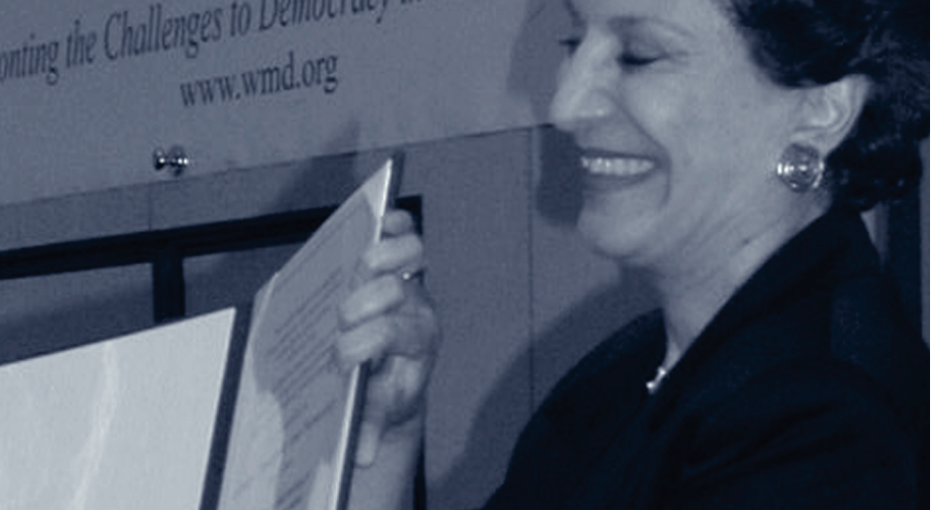I am proud and honored to accept this award on behalf of the Iranian Women’s Movement. It is a special honor to receive the award from the right honorable Kim Campbell whose life’s work and her personal conduct represent all that I and scores of others around the world aspire to. I am thankful to a kindred spirit and supporter of the Iranian women’s struggle, Hafsat Abiola, for kindly reading this message.
The Iranian women’s movement today is heir to over a century of activism and sacrifice. In its latest incarnation, it is a movement without leaders—a movement without offices, or special locations. It is within every woman’s heart and is carefully nurtured in every home across the land. The movement seeks freedom and justice. It stresses humane values. It commits members to do as their conscious dictates. It stresses that the road we travel is as important as our destination, that our means are as significant as our goals. It says through the voices of the many young women and men who have joined the movement in the millions that we cannot strive for democracy if each and every one of us is not a democrat at heart—respectful of others’ identity and opinions and careful of their boundaries and rights. Above all, the movement stresses that we cannot achieve a society imbued with a culture of peace by using violence.
The Iranian women’s movement began some 150 years ago when a devout woman named Ghodrat ul Ein, who sought to rid her people of superstition and prejudice, took off her veil and spoke of freedom to a crowd of her followers. She paid with her life for her desire for freedom. She was called “corrupter of the earth” and “warrior against God”. Over a century later, another woman, Farrokhroo Parsai, a physician who became an educator in order to help young women to become leaders, and later was the first minister of education in pre-revolutionary Iran, faced the same fate. She was executed on the charge of warring with God. I have the honor of sharing the same designation with these two women and numerous others who came after us who are at this moment in prison in Iran. They did not attempt to overthrow the state. They did not disrupt the workings of the government. They had no weapons. But they terrified the regime because they stood for freedom and had the courage to voice their demands.
The Iranian women have had many high points and low points in their struggle. They strived steadfastly for change decade after decade. At the turn of the 20th century when Iran was going through its constitutional revolution, there were a mere hand full of women with an education. Yet this handful was able to organize many to participate in the uprising. In the decades that followed, they benefited by access to education and skills building. By 1963, they had become powerful enough to gain the right to vote against the Ayatollah Khomeini’s fatwa that equated women’s political participation with prostitution and urged his followers to rise against it. During the Ayatollah’s exile, the women’s movement energized by the franchise, and introduction of such auxiliary organizations as the education corps became one of the most advanced in the region. Women achieved substantial legislative reforms, including a landmark family law. They entered the parliament and the local councils in substantial numbers, and a national plan of action to ensure their full participation in development was adopted by the government.
Women participated in full force in the 1979 revolution, not to bring about a theocracy, but to gain full democratic rights. Unfortunately, they learned too late that the revolution was, to a large extent, all about suppressing the rights of women. Before there was a new government, before there was a constitution, The Ayatollah nullified the family protection law. Soon after, the penal code introduced an eye for an eye and stoning to the justice system. Women were segregated in public spaces and forced to veil. For thirty years the battle of women against the Islamic Republic continued. Women organized when they could, published even when they are not allowed, created web sites that were shut down and reappeared in new guise, went door to door to speak to men ad women about the discriminatory laws, demonstrated, were beaten, imprisoned, tortured, and sometimes released on enormous bail and allowed to leave the country and forced to remain in exile. But whether in exile in refugee camps, in prisons inside Iran, or working late into the night sending their messages around the country and across the world, they have not yielded to oppression. Their mobile phones, web sites and blogs carry their words across the nation and throughout the world. Their voice resonates with others who rise up in their support. They are at the forefront of the green movement for change. They know they can change their country and they say “Yes, we will.”

